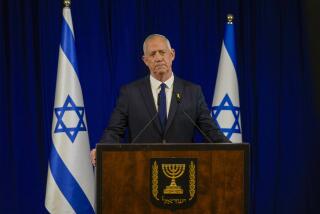Economic Crisis Fells Egyptian Cabinet
- Share via
CAIRO — Prime Minister Kamal Hassan Ali, under fire for failing to deal effectively with mounting economic and security problems, submitted his government’s resignation Wednesday. President Hosni Mubarak immediately accepted it and asked a former finance minister, Ali Lutfi, to form a new Cabinet.
The outgoing prime minister, formerly defense minister and armed forces commander in chief, announced the resignation of his 14-month-old government after Cabinet ministers met Wednesday night. He gave no reason, but informed sources said Mubarak was displeased with the handling of a number of domestic issues, including the failure of the security forces to find the killers of an Israeli diplomat who was gunned down in Cairo on Aug. 21.
“There were also a number of problems--economic and social--that Ali seemed to be too weak to deal with,” a senior Egyptian source said. “There was a feeling that things were getting out of hand and that something had to be done about it quickly.”
Ali’s health was also cited as a reason for his replacement. The 63-year-old prime minister is said to suffer from severe arthritis requiring regular trips to Switzerland for treatment.
‘New Blood’
Less than an hour after Ali’s resignation, Lutfi, a 49-year-old economist, announced that he had begun consultations on forming a Cabinet infused with “new blood.” He told the semiofficial Middle East News Agency that he expects to replace about 10 of the 32 Cabinet members and will announce the new lineup Saturday.
Informed sources said they expect no changes in the key Foreign and Defense ministries. But there were conflicting signals over whether Interior Minister Ahmed Rushdi would be retained. Rushdi’s ministry has come under criticism recently because of several incidents in which security forces have either failed to arrest the culprits or have themselves become the center of controversy. However, Rushdi was also one of several Cabinet ministers who met with Lutfi on Wednesday night, an indication that he may be asked to stay on.
Mubarak, in a letter naming Lutfi prime minister-designate, listed eight key areas in which he said the government needs to improve its performance. They include the economy, education, public services, planning and tourism.
“Mubarak feels that things are not moving fast enough in these areas and that there is a need for a younger and more dynamic leadership to make them move,” a government official said.
Escalating Indebtedness
An International Monetary Fund report issued in June estimated that Egypt’s foreign debt has now mushroomed to $31 billion--almost twice the government’s official estimate--due in part to declining oil revenue. It noted that Mubarak has tried to contain the debt by reducing some subsidies and limiting imports. However, it added that there is an “urgent need” for stiffer austerity measures than the government, fearing domestic unrest, is willing to implement.
A government source said there had been considerable disagreement within the Ali Cabinet over the strapped economy, with various ministries seeking to overrule or block decisions made by others. Egypt’s economic problems are aggravated by severe overpopulation and urban migration.
Lutfi, who served as finance minister in the late 1970s and early ‘80s, is one of Egypt’s leading economists. He has served as chairman of the finance committee of Mubarak’s National Democratic Party and is reputed to have a strong background in public finance. The prime minister-designate is described by one government source as being “dynamic and independent.”
More to Read
Sign up for Essential California
The most important California stories and recommendations in your inbox every morning.
You may occasionally receive promotional content from the Los Angeles Times.













